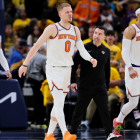The entire NCAA enforcement model is not broken, but future cases must be “done with integrity and consistent with our bylaws” while revisiting any potential problematic practices, the new vice president of enforcement told CBSSports.com on Thursday.
Jon Duncan, who started Tuesday under an 18-month trial period, walks into a tornado of criticism after the NCAA botched the Miami investigation by paying the attorney of ponzi-scheming booster Nevin Shapiro for subpoena power, resulting in the firing of former VP Julie Roe Lach.
“I intend to make sure that the directors and managing directors and all those who are investigating cases understand we need to investigate cases in process and with integrity,” Duncan said. “I intend to ask them on a regular basis the status of ongoing cases. ... I have asked them, all of them, to think about the tools in our toolbox, and let’s look at each of them and make a decision on which are fair and appropriate and which should be revisited.”
Duncan has represented the NCAA in court cases and served as a legal adviser since 1998. He now works full-time in Indianapolis. The former partner at Spencer Fane Britt & Browne in Kansas City was the lead attorney for the NCAA in a lawsuit by a former University of Buffalo basketball coach. He has never presented a case to the Committee on Infractions.
One of Duncan’s first goals will be restoring confidence in the enforcement staff, a group that Duncan calls “talented and experienced” but has been affected by the recent problems.
“We’re going to do that one good decision at a time, making sure all our staff members have the training and ongoing development that they need in order to do what is probably the hardest job in the national office,” Duncan said.
Duncan declined comment on several questions related to the Miami case, citing confidentiality issues.
If the NCAA faces an ethically questionable dilemma in the future, Duncan said the staff is to alert the appropriate parties and “vet that strategy before anything is done.”
“I think it’s important to note the concerns about enforcement are well documented, but there are also a lot of things the enforcement staff does right,” Duncan said. “Not enough people are talking about the things that go right in the enforcement process. This staff processes a lot of cases every year and will continue to do that that’s in a way that’s fair and effective.”
Duncan said he’s aware of past proposals to outsource enforcement but is not familiar with a credible push in that direction.





















